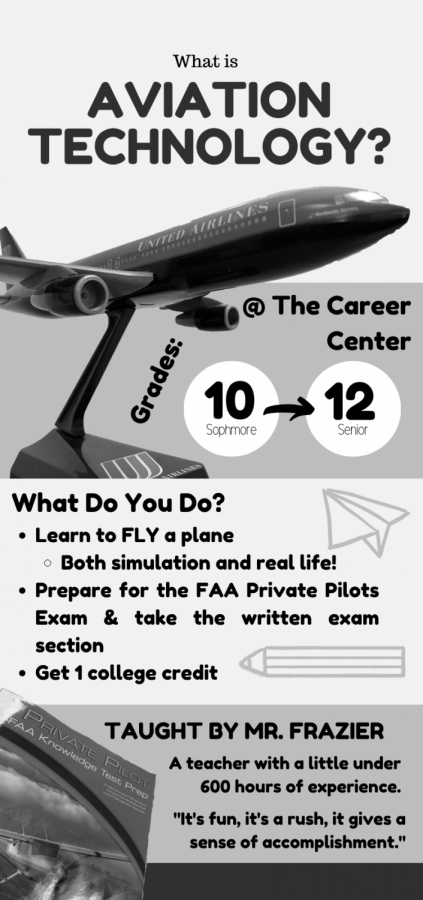Just plane cool
How aviation class is giving students a unique opportunity
One minute students are in a classroom learning all the controls of a plane, the next they are flying one out of Leesburg Executive Airport. The Aviation Technology class at the Career Center allows sophomores, juniors and seniors to complete the first stage of becoming a pilot. With the completion of the course, students are able to take the written part of the Federal Aviation Administration (FAA) Private Pilot exam for free, fly a plane twice and receive one verified college credit. The class is taught by Mr. Anthony Frazier.
“I am a commercial pilot,” Mr. Frazier said. “I have been flying part time since 2002. I have a little under 600 hours [of flight experience], I’ve wanted to do it since I was a kid. It’s fun, it’s a rush, it gives a sense of accomplishment.”
Due to its unique nature, the class is very uncommon and is taught at only four high schools in Virginia. In Mr. Frazier’s opinion, this may be due to the lack of exposure in areas where aviation technology is not well known.
“Only 3% of [the] US populus are pilots,” Mr. Frazier said. “In this area it’s a military community, we are by the Pentagon, there are a lot of military pilots. People just don’t know they can get that program started.”
At the Arlington Career Center where the aviation class is an option, it would be impossible for students to spend every school day flying a plane around the country. To give students flight experience in the classroom, there is a flight simulator that allows students to fly a “plane” without actually travelling anywhere. When they do not use a simulator, they get real experience in a plane.
“It’s fun to use. It has the controls a regular plane has, but it’s a simulator,” senior Ryan Odenwelder said. “[For the real experience] we have to fly a flight pattern in the air and the instructor will land for us.”
Two times during the school year, students schedule flights with a pilot instructor to take their knowledge from the class and put it to real use in a plane. While the first flight is just around the area of Leesburg, the second flight is cross country. This rare experience allows students to explore interests in aviation in a hands-on way and determine whether they want to pursue a career as a pilot. Such students are in luck as it is not required to attend four-year college to become a pilot. According to the Aviation Technology Career Center website, there are numerous career opportunities in the field of aviation for those with high school diplomas and two-year degrees. However, it could still be beneficial to get a supportive degree in another subject.
“If you are [working] long term as a pilot working a job and you get laid off because pilots are all about seniority, an engineering degree, computer degree or math degree will help you stay employed and earn income until you find another pilot job, because your payroll will start over,” Mr. Frazier said. “Definitely get a degree that you can use on the outside.”
However, students are only able to become pilots after successfully completing the rest of the FAA exam that is only provided outside of class. There are two parts to the FAA Private Pilot exam: the written and verbal sections. Students must get a 70 percent or better in each section to pass. According to the Electronic Code of Federal Regulations part 61.109, students are also required to have logged at least 40 hours of flight time to get a private pilot’s license. This requirement would not be reached with the Career Center class alone, which is why students must find a way to obtain flight time themselves. To achieve the 40 required hours of flight time, students could attend a local flight school or go to a community college with a flight program. The Community College of Baltimore County is a close example of a school with an aviation program.
Arlington resident Chris Baker, a pilot working at a large commercial airline, has been flying for 14 years. His advice to students interested in aviation is to make sure flying is a passion before going into a piloting career.
“While an aviation career can be lucrative with many benefits, it is also a high risk career path,” Baker said.. “It can take a long time to reach a point where you are comfortable and stable in your career, and there will always be sacrifices. For me the advantages far outweigh the disadvantages, but it’s not for everyone.”
Students are provided with the rare opportunity of learning to fly a plane only a bus ride away from the school. This beginner-level class prepares students to take on aviation in the real world, and it is free.
“Operating a flight as perfectly as I can is an enjoyable skill to practice,” Baker said. “I couldn’t imagine doing anything else!”










